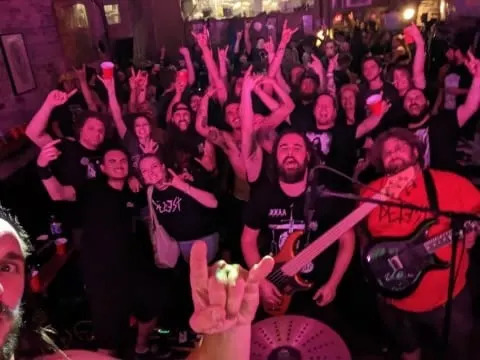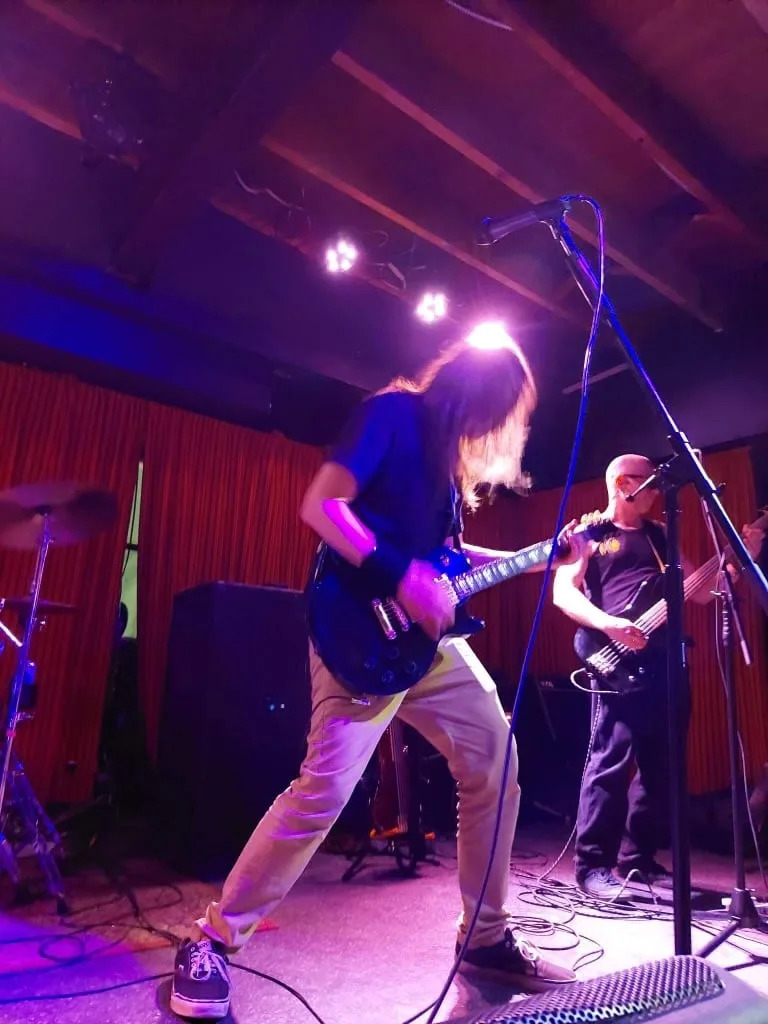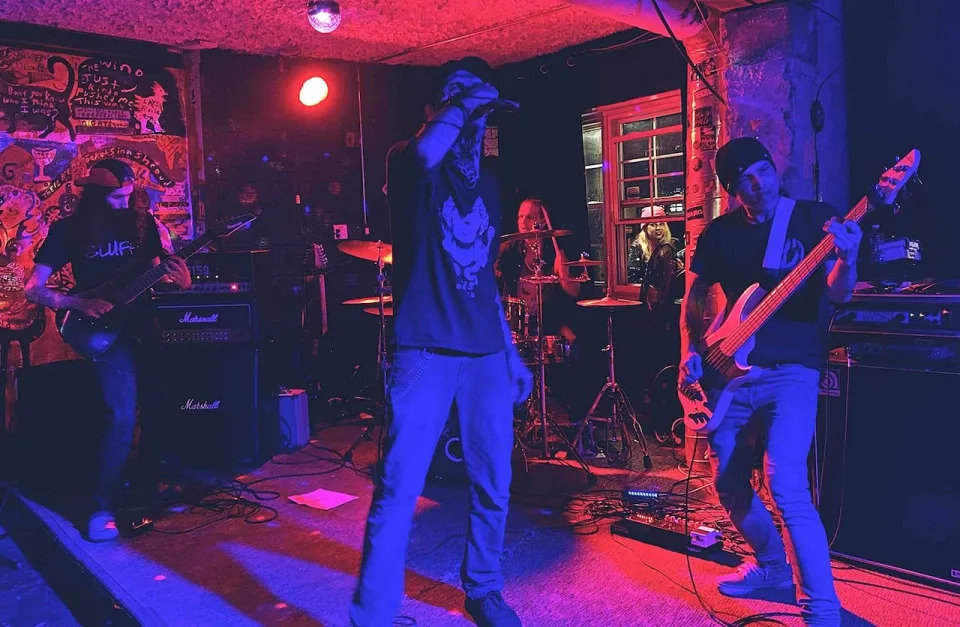A NORTH AMERICAN TREND
CBC
Mon, October 9, 2023

The band Evil Villain paying a show at Beer Bash Toronto, an independent concert series. (Submitted by Chris Lee - image credit)
More than a year after the pandemic and amidst the sale of legendary venues like the Opera House, Toronto bands and artists fear for the survival of the local music scene as access to concert halls narrows and fan engagement wanes.
Large companies like Live Nation Entertainment are buying up more and more concert venues in Toronto and Ontario, such as the Opera House and The Kee to Bala. Others, such as The Reverb, closed their doors after the pandemic.
According to Jonny Darko, a musician who's been playing in bands for several years, this has a direct impact on the community aspect of the local music scene, as bands compete with each other to get gigs in town.
"Everything's definitely thinned out. It was more of a community based situation. But as COVID hit, everything's dwindled down. There's less bands, there's less venues that are available," said Darko.
"You would get some smaller bands bringing the local attention for the larger bands and the larger bands that have the fanbases give attention to the local bands. Everybody involved would gain and that's how it all kept going."

Tail of the Junction venue owner Christopher Blanchard says he's dedicated to the Toronto music scene. (Sarah Tomlinson/Radio-Canada)
Now, larger venues that used to give small groups the opportunity to perform are no longer catering to them, says Darko. He believes it's because owners no longer see them as lucrative.
"People aren't coming out to metal shows as much as they used to be. The community is starting to die down, especially this year. It's surprising," Darko said.
Nowadays, he says bands have to take on more of the task of promoting their shows on their own than they used to, which doesn't always generate satisfactory results for venue owners.
"You get these little shows that nobody hears about it. Maybe three or four people show up and it's unfortunate for everybody involved because it does tend to be a good show either way," said Darko.
Finding alternative ways
Nevertheless, some musicians are finding alternative ways to make money playing music.
Chris Lee, a Toronto musician, now books shows in independent movie theatres like CineCycle near Spadina and Richmond Street, or in rehearsal rooms, to keep more of the profit.
"They ended up being really successful. We really love just booking our own shows. DIY [do it yourself] is the way to go," said Lee.
Given the growing competition between bigger and smaller bands booking shows in the city, he says he finds these DIY shows essential to his survival as an independent artist.
CBC
Mon, October 9, 2023

The band Evil Villain paying a show at Beer Bash Toronto, an independent concert series. (Submitted by Chris Lee - image credit)
More than a year after the pandemic and amidst the sale of legendary venues like the Opera House, Toronto bands and artists fear for the survival of the local music scene as access to concert halls narrows and fan engagement wanes.
Large companies like Live Nation Entertainment are buying up more and more concert venues in Toronto and Ontario, such as the Opera House and The Kee to Bala. Others, such as The Reverb, closed their doors after the pandemic.
According to Jonny Darko, a musician who's been playing in bands for several years, this has a direct impact on the community aspect of the local music scene, as bands compete with each other to get gigs in town.
"Everything's definitely thinned out. It was more of a community based situation. But as COVID hit, everything's dwindled down. There's less bands, there's less venues that are available," said Darko.
"You would get some smaller bands bringing the local attention for the larger bands and the larger bands that have the fanbases give attention to the local bands. Everybody involved would gain and that's how it all kept going."

Tail of the Junction venue owner Christopher Blanchard says he's dedicated to the Toronto music scene. (Sarah Tomlinson/Radio-Canada)
Now, larger venues that used to give small groups the opportunity to perform are no longer catering to them, says Darko. He believes it's because owners no longer see them as lucrative.
"People aren't coming out to metal shows as much as they used to be. The community is starting to die down, especially this year. It's surprising," Darko said.
Nowadays, he says bands have to take on more of the task of promoting their shows on their own than they used to, which doesn't always generate satisfactory results for venue owners.
"You get these little shows that nobody hears about it. Maybe three or four people show up and it's unfortunate for everybody involved because it does tend to be a good show either way," said Darko.
Finding alternative ways
Nevertheless, some musicians are finding alternative ways to make money playing music.
Chris Lee, a Toronto musician, now books shows in independent movie theatres like CineCycle near Spadina and Richmond Street, or in rehearsal rooms, to keep more of the profit.
"They ended up being really successful. We really love just booking our own shows. DIY [do it yourself] is the way to go," said Lee.
Given the growing competition between bigger and smaller bands booking shows in the city, he says he finds these DIY shows essential to his survival as an independent artist.

Chris Lee playing a live show in the city. (Submitted by Ryan Caliano)
Darko says he also started looking to play elsewhere in the region, citing the Casbah in Hamilton or Dundas and Sons in London as great venues that will book emerging bands.
"They don't even oblige a fee for you to book the place. They are relying on the drink rental revenues on the bar side of it and you're bringing attention to the bar. So once again, this community supports itself," said Darko.
Owners need to make ends meet
Sarah Nguyen is the owner of See-Scape, a venue that showcases punk, metal and alternative rock acts. These days, she only books two shows a month to maximize her profit.
"If it's a metal band we've never worked with or a promoter that we've never worked with, we'll usually give them a chance and see how the show does. And then after that we decide if we want to work with them again," she said.
The shows that are successful attract around 60 fans, while others that she deems less successful only attract around 10. She has had to turn away some groups, she said.
"I still have to pay my rent," said Nguyen.
Christopher Blanchard is the owner of Tail of the Junction. In 2022, ticket sales for his shows were down 60 per cent compared to 2019. Despite a slight increase of engagement, he says sales are still down 40 per cent.
One of the causes, according to Blanchard, is bands not putting enough effort to promote their shows.
"They have to listen to other bands' music and bring in musicians from different regions to attract audiences," he said.
The most important thing, however, is not to be discouraged if some shows are less successful than others, says Blanchard.
"It's easy to give up when no one buys tickets for a show, but you have to convince yourself that future concerts will be more successful. Never give up on the local music scene," said Blanchard.
A sector under pressure
Johnny Dovercourt is the artistic and executive director of Wavelength Music and co-author of the study Reimagining Music Venues conducted by the University of Toronto.
According to the study, the ecosystem surrounding the local music scene is at a "critical juncture," with musicians and venue owners facing increasing difficulties generating substantial revenue.
"It's always been challenging, it's always been a competition for limited spaces. With costs increasing so much and venues being shut down for so long, operators are asking for these costs to be covered by the artists," said Dovercourt.

The Band Dawn Valley playing a show at the Tail of the Junction. (Submitted by Johnny Darko)
According to the study, even before the pandemic, the industry witnessed more venue closures than openings, accompanied by rising ticket prices and fewer shows.
COVID-19 exacerbated these issues, pushing 13 per cent of Toronto's smaller venues to close.
His study suggests that concert stages be funded by the government the same way it funds community centres as a means to circumvent the financial challenges facing venue owners.
He expects government support for the sector to decline over the next few years, which could make the situation even worse.
"The future looks rather negative, but we have to be creative," Dovercourt said.
And he's not alone.
Erin Benjamin, the CEO of the Canadian Live Music Association (CLMA), which represents Canadian concert halls, says the organization has been consulting with all three levels of government to highlight the importance of small and medium-sized performance venues and to create programs that support them.
In a statement to CBC/Radio-Canada, the City of Toronto says it understands the issues facing Toronto's music industry, which is why they created a four-year music strategy in 2022.
To support artists, the city has also launched programs such as YYZ Live, Music on the Fly, the Amplified Music on Patios Program, City Hall Live, and Music 311, among others. By 2023, more than 250 Toronto bands had participated.
"Without support, artists will lose the venues they need for their artistic development, and from a cultural point of view, they will no longer be able to tell us the stories that reflect the Canadian experience," Benjamin said.
No comments:
Post a Comment